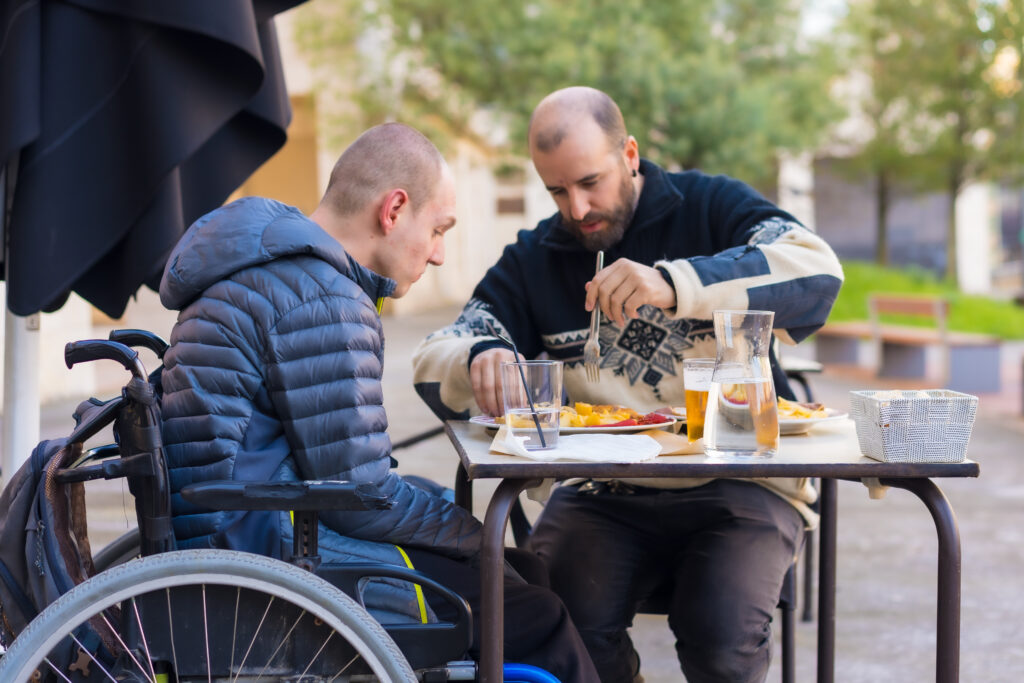One of our team’s favorite subjects for blogs, (like this one), is using our combined knowledge of accessibility to make recommendations to business owners about how they can become more inclusive to current and (potentially future) customers with disabilities.
Whether that’s by speaking about issues we regularly identify when we do access audits for clients within a particular industry, or drawing attention to access requirements which might be necessary for certain types of people to access services – the overall aim is to highlight the benefits that only inclusion can provide to both patrons with disabilities and business owners.
The reason we come back to this topic is because customer satisfaction benefits everyone, and while there is an obvious short term cost involved when ensuring a business’ premises, website, or resources are as accessible as they can be to the widest demographic – the positive impact such attention can have on the individual disabled person, wider society, and the revenue of (basically) all businesses, is simply too beneficial to ignore.
Today, we are drawing attention to businesses who deal in serving food and beverages, who are also part of an industry that we believe stands to gain the most from an inclusive approach to serving customers.
Demographically speaking, the service industry not only has the highest amount of employed people with disabilities, but also a huge number of disabled customers. People with disabilities, in general, are a significant portion of the consumer market that is often underestimated by businesses and service providers. Individuals with disabilities, along with their friends and families, make up a substantial segment of the population – and ignoring this demographic means missing out on a significant potential customer base.

Families of people with disabilities are estimated to spend billions of dollars a year on a global scale, and this amount goes up to over US $8 trillion in disposable income and US $13 trillion when including friends and family according the Valuable 500. In the United Kingdom, this frame highlighting the spending power of people with disabilities is referred to as the “Purple Pound”.
It’s not just a matter of consumer choice or spending habits either, certain groups of people with disabilities who cannot cook themselves depend on the services provided by their local cafes, restaurants, and takeaways as part of their regular diet. Furthermore, adults and elderly/older adults are widely accepted to be the demographic most likely to eat out for lunch and dine out in the evening. Multiple studies and surveys even highlight the fact that older adults typically eat out more than younger adults and teenagers.
Naturally, many of these older adults mention are likely to be disabled themselves or disabled at some point within their lifetime. Add to this the fact that 1 in 6 people worldwide are disabled, (which is about 16% of the world population), a greater picture emerges about the demand for accessible bars, restaurants, and cafes. And where there is demand, there is also money to be made.
So how can businesses tap into the Purple Pound?
By carrying out a site visit and delivering an accessibility audit, our consultancy team can help restaurant, bar, and cafe owners improve inclusive measures across their equities which will lead to increased engagement from disabled patrons, create wider opportunities for disabled people to be employed, as well as enhance the visitor experience for existing customers.
Just some of the recommendations we typically make include provision of hearing enhancement systems, split height counters, a more diverse range of seating options, and menus in alternative formats like Braille and Large Print (the latter of which Direct Access has the capacity to facilitate directly).
By equipping site owners with the knowledge of where improvements can be made – as well as providing steps to address issues, Direct Access helps service providers access a wider audience of disabled people who not only want these services, but have every right to access them. Recently, we were the access consultants for Starbucks, who opened their first ever fully inclusive store in Washington last month.
While the specifics varies from country to country, it is the obligation of businesses to provide certain provisions which ensure accessibility – so if you believe you are falling short of your obligation, or would simply like to maximise accessibility at your site’s premises, consider getting in contact with our team today.